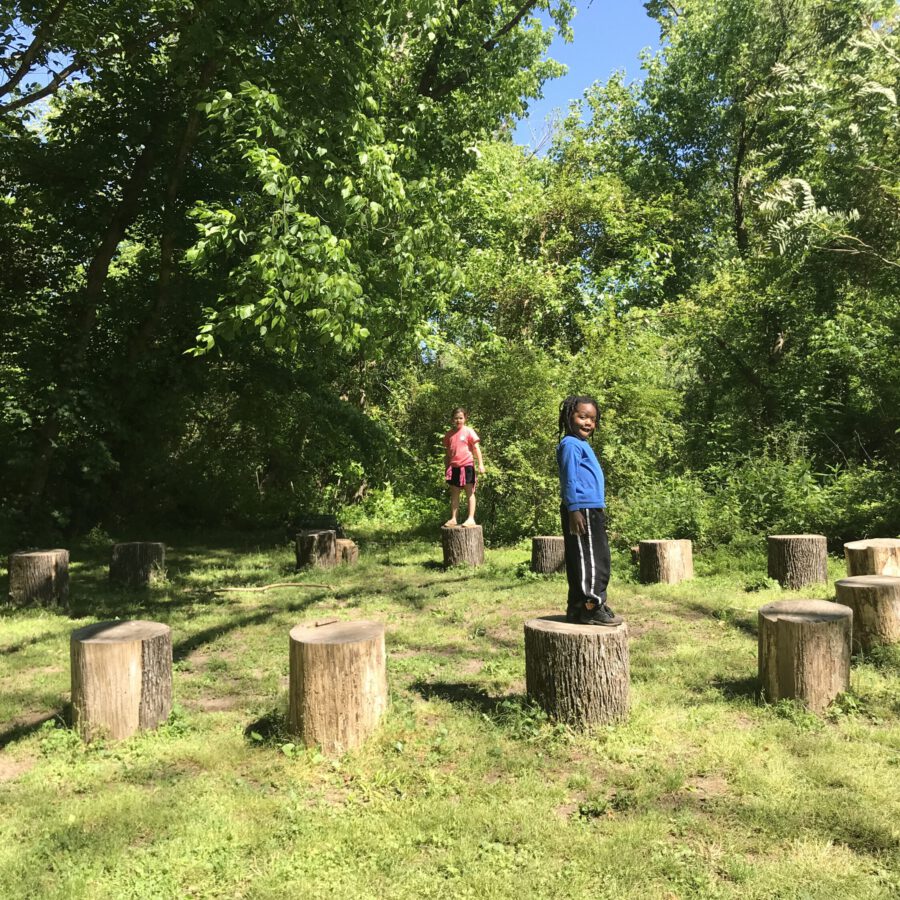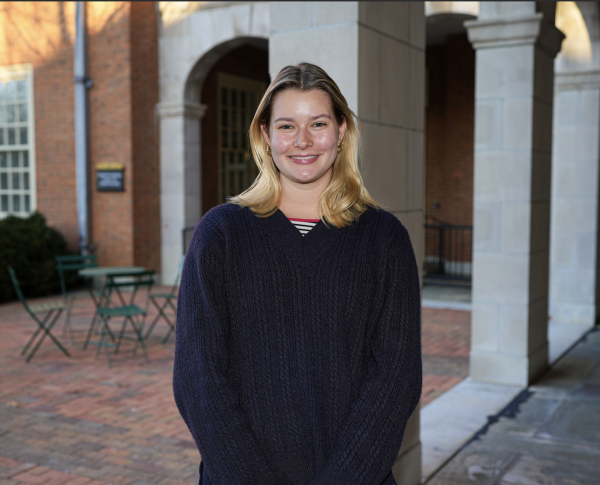Gateway Nature Preserve seeks to mend environments and minds
Located 12 minutes from campus, the preserve is open for exploration year-round
Courtesy of the Gateway Nature Preserve
Visitors explore the Gateway Nature Preserve.
February 28, 2023
A 12-minute drive off campus down University Drive and Marshall Street leads to a nature sanctuary called Gateway Nature Preserve. The preserve is a 19-acre site located near Old Salem and the University of North Carolina School of the Arts. Several trails, a pollinator garden and a Story Circle are a few of the opportunities for visitors. Whether splashing or skipping rocks on the sandy beach near Salem Creek or sitting on the wooden stumps of the Story Circle with friends and family, the preserve serves as a place to take a breath and escape the busy world.
According to its website, Gateway Nature Preserve’s goal is to create environmental and climate change awareness while working toward a more sustainable future through programming and events. Its many community education programs, such as hosting a booth at the Piedmont Earth Day fair during Forsyth Creek Week, display a connection between humans and nature.
Gateway Nature Preserve’s Executive Director Dianna Costello highlighted the importance of nature conservation to both the environment and our souls.
“When we immerse ourselves in the natural world, our worries and concerns seem small and insignificant, and we learn how to soothe our soul with the stillness surrounding us,” Costello said.
Open year-round during daylight hours, the preserve has multiple nature exhibits. One of these is the pollinator garden on the meadow side across from South Broad Street.
In the pollinator garden, multiple food sources and native plant species such as various shrubs and perennials (plants that live for more than two years) are grown for pollinators. Pollinators, like bees and butterflies, are critical in maintaining the health of an ecosystem — helping aid the reproduction of native plants.
“Adding the pollinator hotels will allow us to create a symbiotic relationship, where the pollinators help keep our garden healthy and beautiful,” Costello said. “The native ecosystem we’ve created in our garden will help pollinators thrive and hopefully increase their populations beyond our footprint.”
Costello continued: “The next step we want to accomplish is for the pollinator garden to evolve from a place that pollinators visit to becoming a catalyst toward the rebound of native pollinators and creating a haven for them in the heart of the city.”
These efforts are critical, as urbanization and the introduction of non-native species to the environment puts pollinator populations at risk. Non-native species can harm an ecosystem by competing with native organisms for resources, causing native species to face extinction.
“Our long-term goal has been to complement the canopy trees — and replace the invasive [species] — with native understory trees and native wildflowers that provide visual interest and benefits for wildlife,” Costello said.
In addition to the pollinator garden, Gateway Nature Preserve is home to many educational nature trails. On the trails and around the preserve, there are signs highlighting what tree species are present and how they add to the thriving forest. Signs throughout the trails point to how a healthy forest is essential for the many species that live within the nature preserve, providing information about animals like box turtles and barred owls.
The preserve’s history comes from a place of conservation, as the nature preserve was initially meant to be turned into commercial development over Salem Creek Greenway in 2005-2006. The commercial development was overturned, and in 2007, the Gateway Environmental Initiative was born.
This same year, the initiative reached out to city officials to analyze how this land could be preserved, and it later raised $409,000 from community donations to protect the land. Finally, in 2014, the initiative was able to purchase the land and protect the 19 acres from being commercially developed. The Gateway Environmental Initiative now has a public-private partnership with Winston-Salem’s Parks & Recreation Department.
Eight years later, this well-preserved land holds many opportunities for student involvement and volunteering. Wake Forest students can work in the pollinator garden to lay mulch, pick weeds, prune and pick up litter.
Rebekah Lassiter, a Wake Forest freshman, works at Gateway Nature Preserve as a secretary. She became interested in working here after seeing an advertisement online.
“[Gateway Nature Preserve is a] great outlet to help with environmentalism and connect with the community,” Lassiter said.
Lassiter, also a part of Gateway’s diversity, equity and inclusion team, has worked to install an accessible boardwalk around the garden.
If not volunteering, anyone and everyone is welcome to walk around the nature preserve and settle back into their roots in this urban oasis.
“Nature has a way of putting your life in perspective when you contemplate the beauty and magnificence of the natural world,” Costello said. “It happens when you watch clouds drift aimlessly in the sky or hear birds chirp gleefully in the trees, when you smell the sweet scent of damp earth or admire the brilliant color of wildflowers.”
Interested students can sign up as a volunteer on the preserve’s website.















